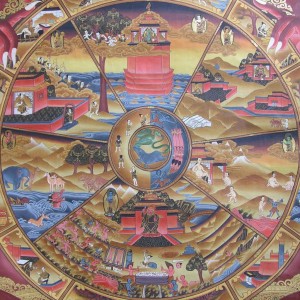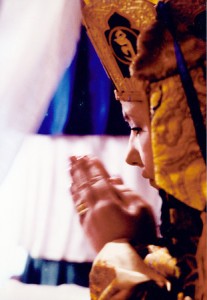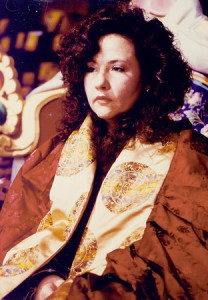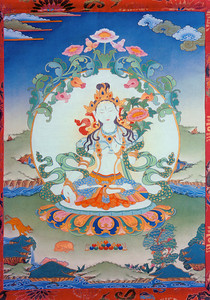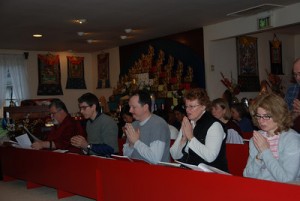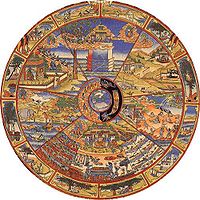
The following is an excerpt from a teaching by Jetsunma Ahkon Lhamo called “Western Chod”
I began to think, “This nature, this is something, this is really something.” So the practice that I engaged in (and this is how I was instructed to do so) was a practice of initially realizing the nature and then examining the cycle of death and rebirth, or what I now understand is called samsara. So I examined the cycle of death and rebirth. And even that term I didn’t have—cycle of death and rebirth. You have to understand I hadn’t heard any of these words before. So I was penning my own words to this idea or concept or reality that I was sensing and the concept that I was thinking about. So I began to think out what is this life that we are living then? This is this absolute nature. What is this life we are living now where we remain kind of blind to this nature? I began to really probe this life and tried to see: What is the best thing this life can give me or give anyone and what’s the worst? I began to examine all the different scenarios associated with ordinary life.
At that time I was living on a beautiful farm in North Carolina and I was 20, so I would have to say that I was a potentially aging hippy girl. I was living on this farm and I had the idea of going to back to the land. I was growing food. I was learning how to grow a garden. At the time I thought that I was so cool with that and so sophisticated. Later I found out that the farmers around us really thought that we were going to starve to death if we were any dumber. But, anyway, we were doing our best, and I learned how to can beans and all that stuff. So I had this wonderful thing going on. I was living at the foot of the mountains. I could walk out on my porch and see the mountains. I had a beautiful little baby boy, beautiful blonde hair. He looked like an angel. I had a wonderful husband and everything was just great.
I tried to think to myself: So this life, what is it? What could it be like? I thought, “What is the best case scenario.” You know, this whole scene that I have right here? What’s the best way this could work out? I really played with this a little bit.
I thought, okay, first of all, this is my initial demand: I never get old. No aging happens here. In my fantasy, these things weren’t going to happen, and when I am queen, they won’t. So I really thought that I am not going to age. This is the first thing: Nobody ages in this. We don’t age or, at least, I personally find the secret of how to use Este Lauder products perfectly, this secret which I am ever questing. I find the way to use them perfectly and finally she comes out with that new product, the one that I am waiting for, the one that makes everything better.
The same thing with my husband. There’s the male version of Este Lauder. We put it on him and he is great, too. My child does grow up, but, of course, he never ages either. Of course, my child grows up to be president or maybe first a doctor and then president. At his inauguration speech and, as well as when he receives his medical degree, at both of those occasions, he says, “It was my mom that made it possible.” Of course, I still look very young, and, of course, I am much more beautiful than I have ever been in my life.
So far this is working out pretty well, don’t you think? My husband and I never get into that place in marriage where you wake up next to each other and go “Hi”, ummm. We never got to that point. In this fantasy, it was always like those old Breck shampoo commercials. Every time we’d see each other we’d come bounding across the room and jump 10 feet into each other’s arms and land on our feet comfortably. It would all be very elegant. It would be choreographed perfectly, and we would both know our parts. I have a lot of romance in me, you see.
So after that we always had really good food to eat and everything is perfect. We live well—two cars and a chicken in every pot, or whatever, and all this kind of stuff. So everything is perfect. Then I thought to myself, “All this happens. Then what is the end of the story?” Well, the end of the story is just like the end of any other story that you can find in the human realm. No matter what Este Lauder does, we are going to get old because time is going to pass. She had not figured out the chemistry of time yet. So time’s going to pass. The end is going to be the same. We are going to be old. We’re going to, at some point, get sick and then we are going to die. I began to meditate on the fact that whatever comes together in samsara has to separate. That’s just the nature of it; it’s never been otherwise. Whatever is born, dies. Whatever is young, gets old. It’s the nature of it.
I meditated on that constantly. Then I would try all these other different scenarios. I tried to develop five or six best case scenarios and I gave myself total freedom. Well, suppose none of this here in front of me works out but, supposing the ultimate man of every woman’s dream rides up on a white horse and that horse does not do-do in the lawn, which white horses are likely to do. So all of that happens and the whole children thing works out where everybody’s rich and everybody’s happy, everybody’s famous or whatever. Well, in my case, it would be private not famous, but that would be the best case scenario.
With all of them, I thought of what it could be like. Every time I explored it, I found that the end result was always the same. It was always old age, sickness and death. The best ones, even if I had one of those funds where you prepare for your old age and even if it’s just prosperous and wonderful right up until the very end—I’d take up golf and die with a gold club in my hand, or something like that, whatever —it’s still going to end up the same way.
Copyright © Jetsunma Ahkon Norbu Lhamo All rights reserved


